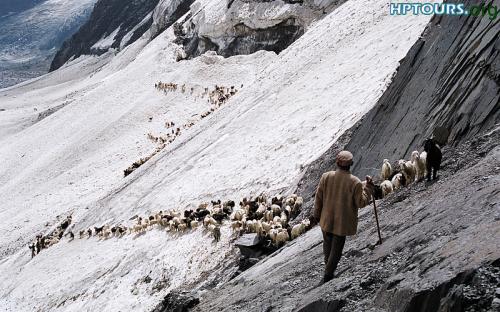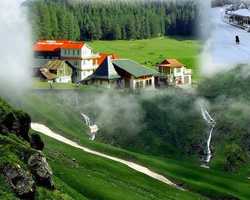65 kms from Chamba is the land of legendary Gaddies, i.e. Bharmaur. Known as Brahmpur in the 6th century, was the seat of power of Chamba state for some 400 years till AD 920, when a new capital was founded at Chamba by Raja Sahil Varman. Bharmaur is known for some very old archaeological remains, primarily the temples. All these temples stand on a level area which call the Chaurasi after the 84 Siddhas who are believed to have meditated in Bharmaur over 1000 years ago. These Siddhas hailed from Kurukshetra and visited Manimahesh.
The oldest temples in the complex are those of Lakshna Devi and Ganesh. Both these temples are made in the hill style with gable roofs and rubble masonry. The outer facade, the inner facade of sanctum, circum ambulatory path and the ceiling are exquisitely carved. The idol of Lakshna Devi in her incarnation as Mahisasurmardini is magnificent.
The tallest temple in the whole complex is of Manimahesh built in Shikhara style of architecture. The temple has a Shivalingam on a raised platform. The other temple in Shikhara style is of Nar Singh. Lord Vishnu in his avtar as Nar Singh has been cast vividly. There is a bronze Nandi of life size which stands facing the Manimahesh temple. Inscriptions on the pedestal of the bull and on the idols of Lakshna Devi and Ganesh date back to the reign of Raja Meru Varman. These idols are believed to be the work of master craftsman Gugga. There is a small water source called Ardh Ganda in a corner of the temple complex. Bathing in its water is considered religiously significant. The country around Bharmour is regarded as belonging to Shiva and is sometimes called Shiv-Bhumi. Being the home of nomadic shepherds Gaddies it is also called Gadderan.
Just 4 kms above Chaurasi temples is the hill temple of Bharmani Devi. A trek to this temple refreshes the visitors as it unfolds the green woods before him.
The best period to visit Bharmour is between April and October.
--














Comment with Facebook Box